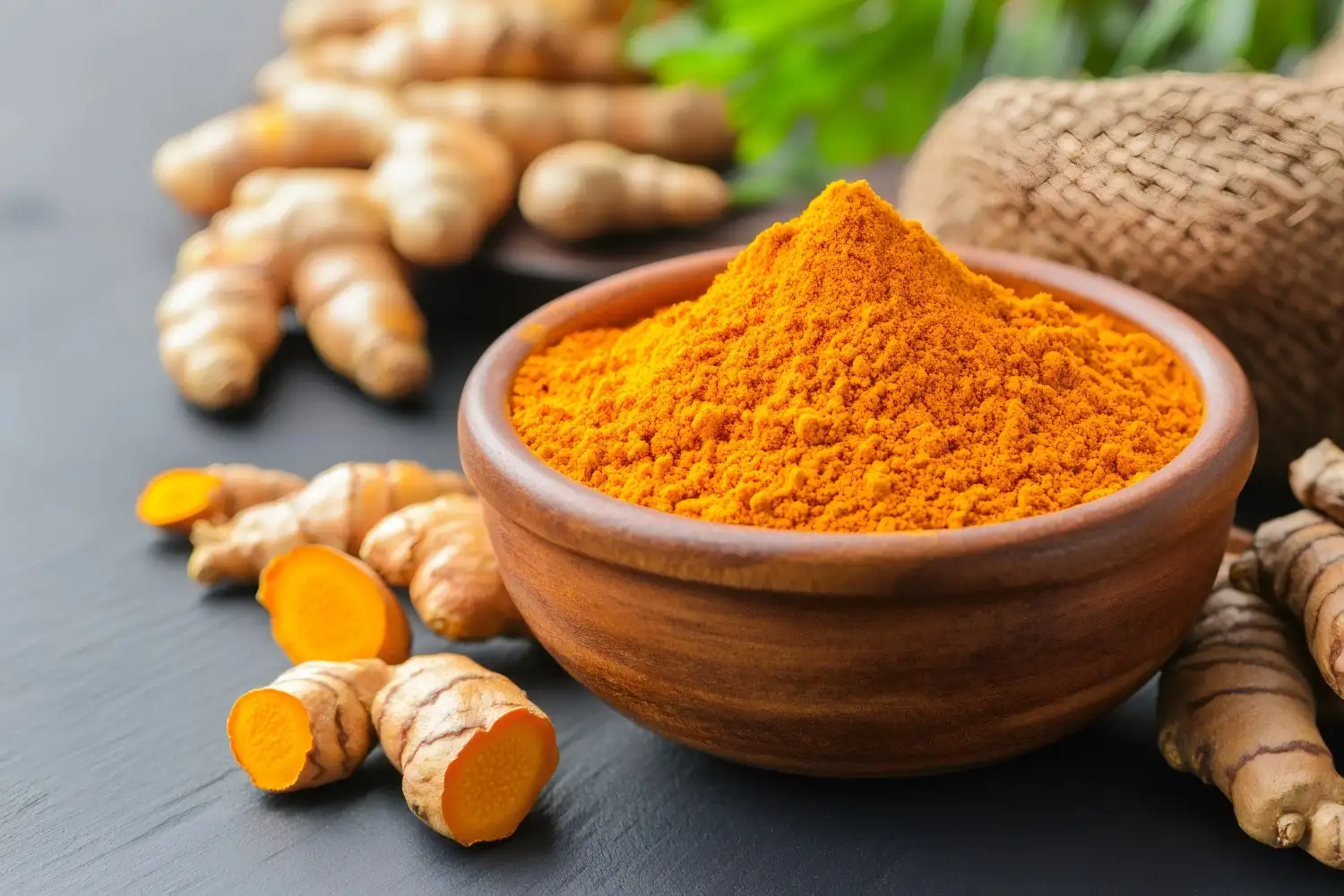Table of Contents
Turmeric has been used for centuries in traditional remedies, but many people still wonder, Is turmeric good for a cold?
Thanks to its active compound curcumin, turmeric may help ease cold symptoms through anti-inflammatory, antioxidant, and immune-supporting effects.
Key Summary:
-
Turmeric may help with colds thanks to curcumin’s anti-inflammatory, antioxidant, and immune-supporting effects.
-
Warm drinks like turmeric tea or golden milk can ease sore throats, congestion, and nighttime coughing.
-
Combining turmeric with black pepper, ginger, honey, or lemon may make it more effective and soothing.
-
Turmeric is safe for most people in food amounts, but supplements or high doses should be discussed with a doctor.
Is Turmeric Good for a Cold?
 The common cold is caused by different strains of viruses, such as rhinoviruses and adenoviruses. Turmeric itself is not a treatment or cure for these infections.
The common cold is caused by different strains of viruses, such as rhinoviruses and adenoviruses. Turmeric itself is not a treatment or cure for these infections.
That said, turmeric’s active compound curcumin has been widely studied for its anti-inflammatory and antioxidant effects.
These properties may support the body’s natural defenses and help ease common cold symptoms like congestion, sore throat, and general discomfort.
Researchers are also exploring its potential role in supporting immune function, although more studies are needed.
How Turmeric Helps During a Cold
Turmeric may ease cold symptoms in several ways, thanks to curcumin’s biological activity. Studies have found it influences inflammation, immunity, and even virus replication. Here’s a closer look:
Anti-Inflammatory Effects
Curcumin blocks certain molecules in the body that trigger inflammation.
Studies have found that it can lower levels of inflammatory markers such as TNF-alpha and IL-6, which are often elevated during infections (1). This may help reduce sore throat, body aches, and swelling linked to colds.
Antioxidant Protection
Turmeric is rich in antioxidants that protect cells from oxidative stress caused by illness.
Research shows that curcumin neutralizes free radicals and stimulates the body’s own antioxidant enzymes (2). This double action can lessen cellular damage and support faster recovery.
Immune System Support
Studies have found that curcumin can modulate immune responses, making white blood cells more effective at fighting off infections (3). But more research need to be done to prove its effect in humans.
This immune-priming effect may help the body respond more efficiently to cold viruses.
Congestion and Sinus Relief
Warm drinks made with turmeric can help thin mucus and promote sinus drainage (4).
While this is more of a soothing effect than a direct medical one, it can bring noticeable relief from a stuffy nose and blocked airways.
Possible Antiviral Properties
Laboratory studies suggest that curcumin may inhibit the replication of certain viruses, including respiratory viruses (5).
While this does not mean turmeric can cure a cold, it does hint at why many traditional remedies include it as part of immune support.
Ways to Use Turmeric for a Cold
 Turmeric can be enjoyed in many forms, from warm drinks to everyday meals. The key is to use it in ways that feel soothing and practical while you recover.
Turmeric can be enjoyed in many forms, from warm drinks to everyday meals. The key is to use it in ways that feel soothing and practical while you recover.
Turmeric Tea
Turmeric tea is one of the simplest ways to calm a sore throat and ease congestion. The warmth helps loosen mucus, while turmeric, ginger, and honey add anti-inflammatory and soothing effects.
Here’s a quick recipe you can try at home:
1 cup hot water
½ teaspoon turmeric powder (or grated fresh turmeric)
1 teaspoon grated ginger
1 teaspoon honey
A squeeze of lemon juice
Golden Milk (Turmeric Latte)
Golden milk is a traditional Ayurvedic remedy often enjoyed before bed. The combination of turmeric, warm milk, and spices can bring comfort, reduce nighttime coughing, and help you sleep better.
To make a cup of golden milk:
1 cup milk (dairy or plant-based)
½ teaspoon turmeric powder
¼ teaspoon cinnamon
A pinch of black pepper
1 teaspoon honey or maple syrup
Adding Turmeric to Food
If you prefer not to drink it, adding turmeric to meals is another easy option. Its earthy flavor works well in soups, curries, and broths, especially when you’re looking for warm, nourishing food during a cold.
Try this simple idea:
Add ½–1 teaspoon of turmeric powder to chicken soup or vegetable broth.
Stir turmeric into scrambled eggs or rice dishes.
Mix turmeric with roasted vegetables for extra flavor and benefits.
Turmeric with Black Pepper
Black pepper is often paired with turmeric because it contains piperine, which helps the body absorb curcumin much more effectively. Without it, much of turmeric’s benefit may be lost.
An easy way to combine the two:
Mix ½ teaspoon turmeric powder with a pinch of ground black pepper.
Add this to tea, golden milk, or soups.
You can also stir it into warm water with lemon for a quick drink.
Other Natural Ingredients That Pair Well with Turmeric
-v1757412883777.webp) Combining turmeric with other natural remedies can make it more effective and pleasant to take when you have a cold:
Combining turmeric with other natural remedies can make it more effective and pleasant to take when you have a cold:
Ginger – helps reduce nausea and soothes throat irritation.
Honey – coats the throat, eases coughing, and has antimicrobial effects.
Lemon – provides vitamin C to support the immune system.
Cinnamon – adds warmth and may help fight inflammation.
How Much Turmeric Should You Take for a Cold?
A typical amount is ½ to 1 teaspoon of turmeric powder per day, or about 500 to 1000 mg of curcumin extract in supplement form. This amount is considered safe for most people and may support your body during a cold.
That said, absorption can vary. Using turmeric in food or drinks with black pepper and a bit of fat (like milk or coconut oil) helps your body use it better.
If you plan to take turmeric supplements, it’s best to check with a healthcare provider, especially if you take medications or have ongoing health conditions.
Final Words
Turmeric is not a cure for the common cold, but it can play a helpful role in easing symptoms and supporting recovery.
Its anti-inflammatory, antioxidant, and immune-supporting properties make it a comforting addition to warm drinks, soups, and everyday meals.
Combined with rest, fluids, and other natural remedies, turmeric may give your body the extra support it needs to feel better faster.
FAQs
Can turmeric cure a cold?
No, turmeric cannot cure a cold. It may help reduce symptoms and support the immune system, but recovery still depends on rest, hydration, and your body’s natural healing process.
Is turmeric tea safe for kids with colds?
Turmeric tea is generally safe for older children in small amounts, but it’s best to keep it mild and avoid strong spices. For young kids, check with a pediatrician before offering turmeric regularly.
How long does it take turmeric to work?
Some people feel relief within a day or two when drinking turmeric tea or golden milk, especially for throat and congestion. However, its deeper immune and anti-inflammatory effects may take consistent use over days to weeks.
Can I take turmeric every day?
Yes, most people can safely take turmeric daily in food amounts. If using supplements or higher doses, talk with a doctor to avoid possible side effects or interactions with medications.
What’s better for colds: turmeric or ginger?
Both turmeric and ginger can help with colds, but they work differently. Ginger is excellent for nausea and throat relief, while turmeric provides stronger anti-inflammatory and immune support. Many people use them together for the best effect.



